OCCUPY CENTRAL - DAY 30: Full coverage of the day’s events
The Occupy protests: a month that shook Hong Kong to its core
The civil-disobedience movement demanding true democracy has gone far beyond what was originally planned - and there's no end in sight
The civil-disobedience movement demanding true democracy has gone far beyond what was originally planned - and there's no end in sight
Paper umbrellas hang at the Admiralty protest site. Photo: Sam Tsang
It's been a month that has shaken Hong Kong. The city changed forever when, at 1.45am on September 28, Occupy Central co-founder Benny Tai Yiu-ting declared the start of the long-anticipated civil-disobedience campaign as crowds gathered to back students arrested at the end of a week-long class boycott.
The massive protests have paralysed streets and sparked unprecedented passion for democracy. The heavy use of pepper spray and the firing of 87 tear-gas canisters by police seemed to encourage rather than repel the protesters. The occupation spread beyond the area around government headquarters in Admiralty to Mong Kok and Causeway Bay, with a brief mini-occupation of Tsim Sha Tsui.
Instantly drawing massive overseas media interest, dramatic scenes of protesters wielding umbrellas and filling streets usually packed with cars and buses brought Hong Kong's democracy movement firmly to the world's attention.
Yet one month on, there is no end in sight. Tensions between the government and its critics have only escalated and threaten to tear the community apart.
The protests have gone far beyond the scope envisioned by Occupy's co-founders. That it has veered dramatically from the script and created a virtually leaderless movement has raised concerns that the situation could spiral out of control.
Tai's original plan was to mobilise 10,000 people to block roads in the city's financial heart if the local and central governments created a system for the 2017 chief executive election that did not allow a "genuine" choice of candidates. He pledged to keep the campaign away from residential districts to avoid damaging people's livelihoods.
The original plan was to gather on Chater Road in Central on October 1, the National Day holiday, and stay in place for about three days. Tai told Bloomberg on September 2 that the organisers would act on a date that "would cause the minimal damage to Hong Kong's economy".
A group headed by Occupy co-founder the Reverend Chu Yiu-ming had applied for a rally in an area of Chater Road closed to traffic on Sundays and public holidays on October 1 and 2, and to use Chater Garden from October 1 to 3. Informed sources within the Occupy movement said its co-founders had informed top government officials about their plan beforehand.
But the plans went out of the window on September 26, when members of the Federation of Students and school pupil-led protest group Scholarism - irate after they were turfed out of Tamar Park in favour of a pro-Beijing rally - barged into a forecourt at government headquarters. The area, known as Civic Square, had been a popular protest venue until it was fenced off.
Scholarism convenor Joshua Wong Chi-fung and several federation leaders were arrested, prompting people from all walks of life to rally in support of them, with Tai, Chu and co-organiser Dr Chan Kin-man among them.
After initially rejecting the idea of an immediate start to their campaign, the three organisers came under pressure from student activists and agreed that what Tai called the "era of civil disobedience" had begun.
From its inception, the civil-disobedience movement veered from the Occupy Central script - after all, it was Admiralty not Central that was occupied.
Organisers were stunned when almost three-quarters of the people already taking part in the sit-in left after the announcement. "Some people did not want the movement to be led by Occupy Central," Chan said. Noting that 80 per cent of protesters flocking to Admiralty were young people, Occupy leaders positioned themselves as facilitators and "service leaders" of the student-led movement. "Recognising that we were part of the movement, we asked Occupy volunteers to take our logo off their uniforms," Chan said.
Yet the shift in leadership from Occupy to the student leaders left the protests less organised than planned and meant decisions required lengthy discussion between representatives of the Federation of Students, Scholarism and Occupy.
As that historic Sunday continued, Occupy organisers suggested that protesters retreat amid safety concerns. Leaders from many parts of the social and political spectrum, including former chief justice Andrew Li Kwok-nang and the city's first chief executive Tung Chee-hwa, urged the protesters to leave to avoid confrontation. Police warned that "robust and firm" action could be taken in the event of violence.
But the federation believed it was inappropriate to disperse before the government made any concession. Occupy leaders were convinced by their argument.
Former Democratic Party lawmaker Cheung Man-kwong said the Hong Kong government should learn from the protests. "It should engage in sincere dialogue with students and other sectors in future to prevent a repeat of such a stunning campaign," he said. While he praised the movement as an inspiration, Cheung admitted Hong Kong society had paid a heavy price for the campaign, which had unavoidably torn the community.
This article appeared in the South China Morning Post print edition as Month that shook a city to its core
Paper umbrellas hang at the Admiralty protest site. Photo: Sam Tsang
It's been a month that has shaken Hong Kong. The city changed forever when, at 1.45am on September 28, Occupy Central co-founder Benny Tai Yiu-ting declared the start of the long-anticipated civil-disobedience campaign as crowds gathered to back students arrested at the end of a week-long class boycott.
The massive protests have paralysed streets and sparked unprecedented passion for democracy. The heavy use of pepper spray and the firing of 87 tear-gas canisters by police seemed to encourage rather than repel the protesters. The occupation spread beyond the area around government headquarters in Admiralty to Mong Kok and Causeway Bay, with a brief mini-occupation of Tsim Sha Tsui.
Instantly drawing massive overseas media interest, dramatic scenes of protesters wielding umbrellas and filling streets usually packed with cars and buses brought Hong Kong's democracy movement firmly to the world's attention.
Yet one month on, there is no end in sight. Tensions between the government and its critics have only escalated and threaten to tear the community apart.
The protests have gone far beyond the scope envisioned by Occupy's co-founders. That it has veered dramatically from the script and created a virtually leaderless movement has raised concerns that the situation could spiral out of control.
Tai's original plan was to mobilise 10,000 people to block roads in the city's financial heart if the local and central governments created a system for the 2017 chief executive election that did not allow a "genuine" choice of candidates. He pledged to keep the campaign away from residential districts to avoid damaging people's livelihoods.
The original plan was to gather on Chater Road in Central on October 1, the National Day holiday, and stay in place for about three days. Tai told Bloomberg on September 2 that the organisers would act on a date that "would cause the minimal damage to Hong Kong's economy".
A group headed by Occupy co-founder the Reverend Chu Yiu-ming had applied for a rally in an area of Chater Road closed to traffic on Sundays and public holidays on October 1 and 2, and to use Chater Garden from October 1 to 3. Informed sources within the Occupy movement said its co-founders had informed top government officials about their plan beforehand.
But the plans went out of the window on September 26, when members of the Federation of Students and school pupil-led protest group Scholarism - irate after they were turfed out of Tamar Park in favour of a pro-Beijing rally - barged into a forecourt at government headquarters. The area, known as Civic Square, had been a popular protest venue until it was fenced off.
Scholarism convenor Joshua Wong Chi-fung and several federation leaders were arrested, prompting people from all walks of life to rally in support of them, with Tai, Chu and co-organiser Dr Chan Kin-man among them.
After initially rejecting the idea of an immediate start to their campaign, the three organisers came under pressure from student activists and agreed that what Tai called the "era of civil disobedience" had begun.
From its inception, the civil-disobedience movement veered from the Occupy Central script - after all, it was Admiralty not Central that was occupied.
Organisers were stunned when almost three-quarters of the people already taking part in the sit-in left after the announcement. "Some people did not want the movement to be led by Occupy Central," Chan said. Noting that 80 per cent of protesters flocking to Admiralty were young people, Occupy leaders positioned themselves as facilitators and "service leaders" of the student-led movement. "Recognising that we were part of the movement, we asked Occupy volunteers to take our logo off their uniforms," Chan said.
Yet the shift in leadership from Occupy to the student leaders left the protests less organised than planned and meant decisions required lengthy discussion between representatives of the Federation of Students, Scholarism and Occupy.
As that historic Sunday continued, Occupy organisers suggested that protesters retreat amid safety concerns. Leaders from many parts of the social and political spectrum, including former chief justice Andrew Li Kwok-nang and the city's first chief executive Tung Chee-hwa, urged the protesters to leave to avoid confrontation. Police warned that "robust and firm" action could be taken in the event of violence.
But the federation believed it was inappropriate to disperse before the government made any concession. Occupy leaders were convinced by their argument.
Former Democratic Party lawmaker Cheung Man-kwong said the Hong Kong government should learn from the protests. "It should engage in sincere dialogue with students and other sectors in future to prevent a repeat of such a stunning campaign," he said. While he praised the movement as an inspiration, Cheung admitted Hong Kong society had paid a heavy price for the campaign, which had unavoidably torn the community.
This article appeared in the South China Morning Post print edition as Month that shook a city to its core
Occupy leaders may still poll protesters on future of movement, Benny Tai reveals
PUBLISHED : Sunday, 26 October, 2014, 3:06pm
UPDATED : Monday, 27 October, 2014, 10:47am
Occupy Central co-founder Benny Tai, Federation of Students' secretary-general Alex Chow, Scholarism convenor Joshua Wong and lawmaker Alan Leong explain the decision to protesters in Admiralty. Photo: Sam Tsang
Occupy Central organisers may yet hold a poll on the future direction of the movement and volunteers are leading "chat groups" at protest sites to collect the views of demonstrators on the streets, Occupy co-founder Benny Tai revealed today.
Speaking on RTHK's Talkabout programme this morning, Tai admitted to making a mistake in trying to run a ballot for Occupy protesters, which was due to be launched yesterday evening, “in haste”.
Just hours before the launch of the electronic ballot the plug was pulled. The decision followed complaints by protesters that the leaders had not sufficiently discussed with demonstrators the poll's methodology or objectives. Shelving, they said, did not however mean the occupation would end, Federation of Students secretary general Alex Chow Yong-kang said.
This morning Benny Tai unveiled a change of direction in an attempt at appeasing the protesters and said lessons had been learned.
"We have started these chat groups,” Tai said. “Many volunteers are now collecting protesters’ views in the occupation zones to see how the movement should move forward.”
“We have neglected the fact that a civil movement is not just about voting, but also about making decisions from bottom up. Now we are going back to this step and see if we should need another vote,” he said, adding that technical problems for online voting at the protest sites had been sorted out.
The discussions instigated by the chat groups would include, among other subjects, whether five pro-democracy lawmakers, from each of the city’s five geographical constituencies, should resign, triggering a de-facto city-wide referendum, Tai said.
Alex Chow Yong-kang, secretary-general of the Federation of Students, also noted the poll had met with doubts from protesters.
“Some think the wording of our motion was too mild. They felt as if we are taking a step backward, after all this time they have occupied the streets,” Chow said, referring to one of the motions that the public sentiment report submitted by the government to Beijing must “propose” the national legislature withdraws its August decision, which laid down a strict framework for the city’s chief executive election in 2017.
Chow urged the government to lay down a roadmap to achieve equal suffrage. “Some people are too sympathetic with the government and think they cannot do anything,” he said. “But the government has thrown the proposals of setting up a platform without explaining what to do with it. They must have thought it through before making the suggestion,” he said.
The decision to scrap the poll came after some protesters said it was redundant. A huge banner that called for delaying the poll was hung from an Admiralty footbridge yesterday morning.
Announcing the axing of the poll, Occupy Benny Tai said last night: "The public may feel there are problems with the movement's organisation and leadership, and we admit that … I promise that in the future, we will give sufficient notice to and discuss with protesters before making a major formal decision."
Protester Shirley Cheung, 40, agreed it was right to delay the poll. "The government has met [Occupy] organisers," she said in Admiralty. "We need to wait for the government's reply. The organisers should spend more time talking to the protesters on what the next step should be."
Chief Secretary Carrie Lam Cheng Yuet-ngor, who led a government team to talk to federation leaders last Tuesday, would only reiterate the government's sincerity in holding further talks. "I don't know what this action implies," Lam said. "I can only say the government started the dialogue with the federation with the greatest sincerity … and made a very proactive response."
At the meeting, Lam had offered to consider submitting a public-opinion report on Beijing's political reform framework to the State Council's Hong Kong and Macau Affairs Office. She had also suggested creating a discussion platform for post-2017 political development. The federation said the offers lacked substance.
Two motions were to be put to last night's vote, which was to be held over two nights. The first called on Beijing to withdraw its August ruling. The second called for the scrapping of functional constituency seats in the 2016 legislative poll and for public nomination in the 2017 chief executive election.
City University political scientist Dr James Sung Lap-kung believed the poll U-turn could ease tensions. But it "gives people the impression that the Occupy protests lack leadership and organisation and that the leaders have no idea how the movement should proceed", he said.
Meanwhile, anti-Occupy group, the Alliance for Peace and Democracy, urged civil servants to sign its petition, launched on Saturday, opposing the occupation protests and backing the police. About 650,000 people had signed by last night.
A government spokesman said all political appointees, except Secretary for Justice Rimsky Yuen Kwok-keung, would sign the petition online to show support. Yuen would not take part, so as to stay neutral.
Tony Cheung, Phila Siu, Ernest Kao, Timmy Sung and Ng Kang-chung
This article appeared in the South China Morning Post print edition as Occupy leaders pull plug on poll
Strong government needed to maintain stability, says financial secretary
Writing in blog post, John Tsang cites Francis Fukuyama and historical examples of democracies with ineffective governance
PUBLISHED : Sunday, 26 October, 2014, 5:36pm
UPDATED : Monday, 27 October, 2014, 5:11am
John Tsang said that although democracy was an important component for political order, strong government and rule of law were indispensible. Photo: Simon Song
Strong government and rule of law are needed to maintain social and political stability, the city’s financial secretary wrote again today, this time borrowing ideas from American political scientist Francis Fukuyama.
Writing in his weekly blog in Chinese, John Tsang Chun-wah cited excerpts from the scholar’s new book Political Order and Political Decay to highlight the importance of social and political stability in successful liberal democracies, and its relevance to Hong Kong.
Citing Fukuyama, Tsang said that although democracy was an important component for political order, strong government and rule of law were indispensible.
“History has many examples of countries that have democratic systems but lack effective governance,” said Tsang, pointing to “Africa, South America and Europe’s Greece”. “The author’s opinions are well worth consideration for Hong Kong.”
Tsang said a mainland friend had recommended the book, but he also admitted he had not actually finished it and had only read a few book reviews.
“Looking at the current situation in Hong Kong, the demands for accountable democracy from most of the students and citizens participating in the Occupy movement are clear.
“But the means they are using today, including occupation of roads, non-cooperation and contempt of court … will certainly cause damage to government operations and the foundations of rule of law.
Tsang added that once it became the “new political paradigm” the impact would not be short-term but long-term politically instability.
“Rome was not built in one day, but to destroy Rome would only take that momentary slip,” he mused.
Tsang expressed concern that large scale non-cooperation by opposition lawmakers in the Legislative Council in light of the Occupy Central movement could further slow down progress of public works and push up their costs.
He cited the 21 delayed projects which failed to be approved by the Public Works Subcommittee last term, which has pushed up costs by a total of HK$1 billion.
“A group of colleagues and I feel very helpless toward this situation and we are unable to understand why the political problems in front of us must come at the sacrifice of Hong Kong’s well-being,” Tsang wrote.
This article appeared in the South China Morning Post print edition as Tsang cites U.S. political scientist
Hongkongers look in vain for the leadership they need
Mike Rowse says after weeks of protests, we're still mired in a deadlock
PUBLISHED : Monday, 27 October, 2014, 4:06am
UPDATED : Monday, 27 October, 2014, 4:06am
A woman calling on protesters in Admiralty to leave is reflected in a mirror held up by the activists. The student protesters have captured our hearts but they seem to have no end game. Photo: AFP
Suppose a spaceship were to arrive from Mars and land in Statue Square. A party of little green men descend and ask to meet Hong Kong's leaders. To whom should we introduce them, I ask myself.
One obvious candidate would be Chief Executive Leung Chun-ying but, in recent weeks, he has delegated most responsibilities to the chief secretary, saving for himself only the important task of giving outstandingly awful media interviews.
Carrie Lam Cheng Yuet-ngor is viewed favourably by most people, or at least was until recently, though her standing may have taken a hit after the rather wooden performance in the debate with students. But one reason we are in this present pickle is that she refused to meet them in the first place during the consultation phase of the political reform process. And not only the students: other moderate democratic groups were also pointedly ignored.
What kind of leader sets out on a high-profile public consultation exercise, but deliberately leaves out whole swathes of the community? And then presents a report to the central government, pretending that it is a fair reflection of the community's views.
If the civilian side of the administration can't be relied on, how about the disciplined arm? Police Commissioner Andy Tsang Wai-hung has had a lot on his plate, and his men and women have put in a generally commendable performance, so he should be considered. But then we remember that he completely disappeared for the first three weeks of the biggest single policing operation of his career. So, perhaps not.
On we go, next stop our legislative councillors. They will be evenly divided between those who think Martians should not be allowed in Hong Kong because they are not mentioned in the Basic Law or various interpretations/decisions of the Standing Committee of the National People's Congress, and those who think they should be enfranchised and given their own representatives in the nominating committee. Better leave them to sort that out first. How about the three wise men who dreamed up the whole idea of Occupy Central in the first place? Just where are associate professor Benny Tai Yiu-ting, Reverend Chu Yiu-ming and Dr Chan Kin-man anyway? Well, the short answer is they were gazumped in their own civil disobedience movement by the students. By their own admission, they have lost control of the situation and are not in a position to steer the occupation anywhere. How could we present them to our visitors as people of influence?
Which leaves us with the Hong Kong Federation of Students. Their leaders - Alex Chow, Lester Shum, Yvonne Leung, Nathan Law and Eason Chung - are scarily intelligent, articulate to a degree and passionate about Hong Kong's future. They totally outclassed the government team in the recent televised debate, and clearly they are the best candidates to emerge so far. But, alas, I think they are weak on strategy. They captured our hearts and led an occupation of key road junctions that has had a major impact on daily life.
But they have no end game, no exit strategy. Their "plan", if it can be called such, seems to consist of sitting in the streets until something turns up. They should have quit two weeks ago while they still had the initiative, with the unspoken threat to return if necessary.
Well, Beijing has no intention of changing course, and the Hong Kong government doesn't seem to have the brain power to break the impasse. So I am afraid that unless the youngsters have a sudden brainwave, we are stuck where we are.
But I have an idea of my own: why not just ask the little green men if they would like to take over running the whole damn show?
Mike Rowse is managing director of Stanton Chase International and an adjunct professor at the Chinese University of Hong Kong.mike@rowse.com.hk
This article appeared in the South China Morning Post print edition as Hongkongers look in vain for the leadership they need
Civil exchange between students and government a good start to improve Hong Kong politics
Alice Wu says while both the students and officials did not veer from their respective position, they at least talked, instead of trading insults
It was refreshing to see people disagreeing without resorting to cranking up the volume to drown out others. Photo: Bloomberg
Dialogue is better than nothing. It at least gives us a far better way of assessing how close or far away we are from reaching a resolution.
In what many - including yours truly - hope to be the first of more talks to come, last Tuesday's meeting between student protest leaders and the government may not be as fruitless as it has been portrayed. To believe that 105 minutes of talk would get protesters off the streets would make one hopelessly naive.
It is what it is: two sides trying to explain themselves. One side sees infinite reasons to support their aspirations; the other sees clear and finite constraints. One sees only one way out; the other sees some wiggle room. One says all or nothing, now or never; the other says take some now, and now is not the time to say never.
At the very least, no one threw a fit. Both sides of the table handled themselves and the other side politely and with respect. Despite the expressed and scripted remarks of "disappointment", I'm going to go out on a limb and say it was quite an achievement in today's Hong Kong.
What was most striking perhaps is that talking is so much more civilised than screaming at each other. It was refreshing to see people disagreeing without resorting to hurling insults and cranking up the volume to drown out others.
It shed light on exactly what we need to change in our political culture. For one thing, it certainly beat the theatrics we have come to expect from our legislators. Throwing things, no-shows, being dragged out by security - such behaviour gets old and tired, very quickly.
Secondly, the refrain from vapid sloganeering and grandstanding was most inspiring and encouraging: Hong Kong politics need not suffer from impoverished vocabulary. That's something for our legislators to think about.
Finally, it re-injected the idea of moral obligation into the public sphere; something we badly need. The fact that both sides, especially the students, showed up, showed up prepared, displayed goodwill, and were armed with courtesy instead of hostility was a timely reminder that as political agents, there is a minimal moral obligation to uphold common decency and mutual respect.
Last Tuesday's meeting was a good start, and we'll need more of that to get us out of this impasse. There isn't a lot of time for either side to break new ground. The government's offer to submit a separate report to the State Council needs to be taken seriously. The student leaders can play a defining role in how that is penned. Continuing dialogue with the government would give student leaders the chance to better explain themselves to Beijing, and lessen the room for misinterpretation or misconstruction.
And as a show of good faith, the government needs to outline what it would take to amend the Basic Law, 24 years after it came into effect. Article 159 was written for a reason. The government must at least lay out clearly what changing the Basic Law would entail. The student leaders are owed that, at least. For, what they are asking - the elimination of the nominating committee - is essentially that.
Alice Wu is a political consultant and a former associate director of the Asia Pacific Media Network at UCLA
This article appeared in the South China Morning Post print edition as Civility at last
Time for C.Y. Leung to take reality check
The chief executive can't simply say he has done nothing wrong in the face of the Occupy protests
Tung Chee-hwa has come out in verbal support for Leung Chun-ying.
One hand cannot clap and in a democratic society, no government can succeed without the trust and support of the people.
For Chief Executive Leung Chun-ying, one of his problems is that he doesn't believe he has done anything wrong, ever.
Politics aside, will you accept a person who believes he has always made the right decisions and done great things, and if there is any problem, it is not his but others?
For Leung, it is just difficult for him to reflect on what he could have done wrong and acknowledged it in public.
It is his extreme self-importance towards governance that has contributed to the city's worst political crisis in decades.
Leung just didn't want to admit to any problems even when thousands of protesters lost their patience and decided to occupy the streets to voice their frustrations.
Tung Chee-hwa, the first chief executive after the handover, apparently didn't think Leung had done anything wrong and has come out in verbal support for him.
The Occupy Central movement was tearing the community apart, said Tung, now a vice-chairman of the Chinese People's Political Consultative Conference, which advises the central government.
Leung, as the city's top leader, has repeatedly shown his weak governance
He said Leung, who is facing calls to step down by various political groups, students, scholars, the press, and even an influential pro-Beijing legislator, "has done nothing wrong".
We all know Tung has been one of the strongest supporters of Leung. For them, friendship is one thing, but reality is another.
The reality is Leung, as the city's top leader, has repeatedly shown his weak governance, bad decisions and policy missteps since he took office in July 2012, not to mention the worst interview he just did with the foreign media about why the poor shouldn't get more involved in elections.
How can Leung explain the situation in Hong Kong today if not for the governance problem on his side? Just simply blame the so-called "foreign interference"?
Are Hongkongers so simple-minded and naive that they can be easily fooled and influenced by "hostile foreign forces"?
For Leung, Tung and Beijing, it's time to face the reality. Admit your problem and open your heart. Otherwise, no matter how many rounds of dialogues that the students and government may hold, Hong Kong will go nowhere.
The students may have their problems but Leung should be more responsible and wake up to the political reality that he just can't simply escape by saying he has done nothing wrong.
George Chen is the SCMP's financial editor and a Yale World fellow.Mr Shangkong columns appear every Monday. Follow@george_chen on Twitter or visit facebook.com/mrshangkong
This article appeared in the South China Morning Post print edition as Time for Leung to take reality check
Religion on the Occupy Central front line puts faith into practice
Christians, in pursuing equality and justice, have long been part of the city's fight for freedom
PUBLISHED : Monday, 27 October, 2014, 6:07am
UPDATED : Monday, 27 October, 2014, 9:20am
A Guan Yu figurine in Mong Kok. Photo: Sam Tsang
In Mong Kok, Taoist god of war Guan Yu sits in an impressive makeshift temple within the protest site; sharing the spiritual space is a chapel where Christians can pray and a place where Buddhist chants are played through a speaker.
The role of religion in the pro-democracy protests transcends figurines at protest sites. A joint statement signed by leaders of Hong Kong's six biggest religions on October 15, offers to serve as middlemen between the government and people.
Watch: The religious deities of Occupy Hong Kong
The religious leaders' gesture was genuine and simple - to curb violence and bridge differences for the good of the city. Although the offer was not taken up, it does highlight the possible role of the city's religious leaders in creating dialogue.
Christianity in particular has long been entwined with Hong Kong's fight for freedom and genuine democracy, and Christians can be seen at all three protest sites, holding prayer services and Catholic mass, and offering counselling and prayer.
"In politics, there is no neutrality. Having no opinion is an opinion. And more often than not, having no opinion would be taken as support and leverage for the ruling group," said the Reverend Yuen Tin-yau, president of the city's Methodist Church and chairman of the Hong Kong Christian Council.
"Equality and justice are core teachings in Christianity and for that reason Christians tend to support democratic development ... It shouldn't be a small group of people controlling the power to manage society," said Yuen, who admitted that opinions on the movement were diverse within the community.
The Reverend Chu Yiu-ming and Benny Tai Yiu-ting - two of the three Occupy Central co-founders - are Christians, as is Scholarism leader Joshua Wong Chi-fung.
Of the six signatories of the religious leaders' statement, Yuen and Catholic Bishop Joseph Ha Chi-shing responded to the Post's inquiries, while the Confucius Academy and the Hong Kong Buddhist Association did not. The Hong Kong Taoist Association said its chairman was out of town and there was no one else to answer inquiries, while the Chinese Muslim Cultural and Fraternal Association said they had "nothing to do with the statement".
Justin Tse, a social geographer and postdoctoral fellow at the University of Washington, conducted extensive research on the relationship of Christians to civil disobedience in Hong Kong including the "Umbrella Movement". He said Christian influence went beyond the initial participation of believers.
"This is not to say that official church institutions are deeply involved," he wrote in an email. "Instead, what it means is that Hong Kong people have been so deeply influenced by Christianity through a variety of civil society channels - schools, media, social services - that they are able to practice and articulate their activism in Christian terms."
Calls made by official church bodies may be modest, while individual clergy or parishes showed more support, he said.
The Hong Kong Christian Council has released various statements over the past three weeks, including urging the government to listen to the "clear message Hongkongers and Hong Kong students are voicing", as well as condemning excessive force by the police.
The council also expressed "deep disappointment and concern about the [National People's Congress] decision" on electoral reform, calling it "a regression of the existing election system and therefore of democracy".
Ha said Catholicism was based around the idea that God loved people and in God people had value and equality, which may lead to a stronger thirst for freedom and democracy. But rules of peace and nonviolence must apply in any fight for freedom, he added.
Ha reaffirmed that the Catholic Church allowed for the freedom of differences and diverse opinions. "We are not a political group - we are a religious one," he said. "On such matters we have to stand on neutral grounds."
In Admiralty, Pastor Wu Chi-wai has led prayer meetings at 7pm every day since the movement started. Dozens of people would also come to the tent set up for counselling and prayer, sometimes just to chat, he said.
"We want to be part of that emotional support for students or anyone who needs it here," he said, indicating that dozens of volunteers from a network of churches kept the tent open.
"The [political] issues won't be going away any time soon, and as Christians and participants of society I believe we have much to give."
This article appeared in the South China Morning Post print edition as Religion on the front line puts faith into practice
Preschool politics and protests: it's not child's play
Sit-ins are a good way to understand how democracy works - but leave the kids at home
When it comes to children aged four or five, no matter how good the intention is, they're too young.
With no end in sight to the pro-democracy sit-ins after last week's talks between student leaders and the government, a new worry has emerged: the safety of young children being taken to the protest zones.
Should parents take their children to the protests, or even be discussing the Occupy Central movement with them?
These are questions many have asked after video clips and photos did the rounds on the internet this week, showing kindergarten teachers trying to explain to their charges what was going on in the city.
Last week in Mong Kok, young children stood between protesters and police in a "human shield" tactic that Chief Superintendent Steve Hui Chun-tak, of the police public relations bureau, said was "extremely selfish and reckless, and totally unacceptable to the public". Parents were warned not to put their children's safety at risk by taking them to the Mong Kok site, where violence has flared in recent weeks.
The debate got heated. Some were completely on the side of the police, saying kindergarten pupils were too young to be trying to comprehend the political debate - and why should they have to?
And they argued that young children certainly shouldn't be taught to take part in illegal activities under the guise of doing something heroic.
Others argued it would do no harm to let the future generation have a taste of politics, and to teach them about democracy.
Inspiring young people - not just little children but teenagers as well - and educating them about politics and public affairs, and the idea that their views and opinions count can be powerful. And it's certainly a good way to understand how democracy works. But when it comes to small children - some of them aged four or five - no matter how good the intention is, they're just too young.
Some questioned whether the kindergarten teachers were not educating but brainwashing.
Whatever your views, this raises a key question: how do we educate the next generation?
There is no doubt that both the Hong Kong government and Beijing want the post-1997 generations to be patriotic. But how do they do it?
Ever since the handover, the government has been criticised for failing on education: by those who say the government is trying to brainwash students with pro-Beijing teaching materials, versus those who say not enough has been done to educate the younger generation about the motherland.
Education reform has been seen as a failure - especially when Chinese history was dropped as a compulsory secondary school subject in 2000. Many said a sense of nationalism could not be developed without adequate knowledge of Chinese history.
History lessons can certainly help in understanding one's country; the good and the bad. Whether they engender this sense of patriotism as well is another matter. But after the row over Chinese history, the government's attempt in 2012 to introduce national education as a compulsory subject sparked an even bigger backlash.
The plan ignited mass protests by those who saw the subject as an attempt to brainwash young Hongkongers. The administration was forced to abandon the idea.
Under "one country, two systems", the city retains its own education system. Schools and universities do not have to follow the mainland curriculum. There is academic freedom. Pro-democracy student unions are active, as are teachers' unions with opposing political views. All of this is essential to nurture the minds of our future generations. As the saying goes: "It takes 10 years to nurture trees but 100 years to train people." But is it necessary to bring politics into kindergartens? This needs some serious thought.
This article appeared in the South China Morning Post print edition as Preschool politics and protests: it's not child's play
Arts scene takes cue from Occupy movement
PUBLISHED : Monday, 27 October, 2014, 6:07am
UPDATED : Monday, 27 October, 2014, 6:58am
Physical Theatre - A Simple Space. Photo: SCMP
The Occupy Central protests have had an unexpected effect: the past month of civil disobedience has unleashed creativity and a yearning for free space among the youngsters who have participated.
And that has prompted some in the arts world to come up with new strategies for their events.
The first one is the annual Freespace Fest, on November 22 and 23 at the West Kowloon waterfront promenade.
Its organiser, the West Kowloon Cultural District Authority, is lining up a more solid programme compared to the first two years of the outdoor arts and cultural event, where performances are secondary to encouraging people to simply enjoy a picnic, play some football and relax outdoors.
Hopefully, the change will win over residents who now get to immerse themselves in open space and democracy-inspired creativity for free - without having to buy HK$50 tickets for the festival.
"It's not Freespace Fest losing out to the Occupy protests. It is this new energy released by the Occupy protests," art critic Damian Cheng said.
He noted Occupy had transcended its political cause, become an "umbrella movement" and unleashed the public's desire to use public space creatively - culminating in the "I want true universal suffrage" banner hung on the iconic Lion Rock last week.
For the past month, the world has been treated to an explosion of protest images created by Hong Kong's youth, such as the Lennon Wall and Umbrella Man sculpture.
These were widely circulated alongside those depicting police's use of tear gas on protesters on September 28.
Blocked roads in Admiralty and Mong Kok have also been turned into impromptu hubs of creativity.
"How does Freespace Fest face this desire [for creative use of public space]?" Cheng asked.
Louis Yu Kwok-lit, the authority's executive director of performing arts, agreed the outdoor culture had changed and event organisers must move forward.
"In the past, we questioned whether Hongkongers liked outdoor activities," Yu said. "Can they stand the sun and the rain? During the first year of Freespace Fest, we wanted to promote the concept of enjoying open space."
He said outdoor events had surged in popularity in recent years. That, together with the transformation of Admiralty's Harcourt Road into the city's largest free space, had proved locals needed open areas, he said.
Yu said Freespace would reposition itself with stronger programming in dance and theatre, over and above its musical roots. "We must take things to a new level. It is not about lying on the grass to enjoy the sun any more."
He pledged that any content related to the "umbrella movement" would not be censored.
Low Kee Hong, the authority's head of artistic development for theatre, said audiences would be asked to take part directly in the arts this year rather than just being passive viewers.
For instance, people attending the Freespace headliner, M.U.R.S., must use a smartphone app to help explore how technology affected people's lives and political frontiers in the digital world. The interactive theatrical show is presented by La Fura dels Baus from Spain.
Cheng expected the Occupy protests to pave the way for future cultural development.
"The government and cultural policymakers must deal with this new desire," he said.
"There's no turning back. It is like, having tasted the freedom to choose love, who would want to go back to arranged marriage?"
This article appeared in the South China Morning Post print edition as Arts scene takes cue from Occupy creativity
Jaded Occupy Central co-founder Benny Tai Yiu-ting reclaims his voice
PUBLISHED : Monday, 27 October, 2014, 6:07am
UPDATED : Monday, 27 October, 2014, 6:07am
Jaded Occupy Central co-founder Benny Tai Yiu-ting reclaims his voice
For days after government officials called off planned October 9 talks with student leaders, the usually eloquent Benny Tai Yiu-ting was strangely absent from the limelight.
The Occupy Central co-founder had holed himself up in a tent next to the government headquarters in Admiralty, in the thick of the protest he launched.
Having fought off numerous battles to pursue his democracy mission, he seemed at last to have been felled by the setback to what was seen as the only way to end the Occupy action.
No one could get him to talk - not the press, not even his allies. In the rare moments when he came into sight, Tai would wave a weary hand to signal his reluctance to speak to journalists.
"I hid in the tent for days and did not want to step out as I could not come up with solutions to some problems," Tai said.
"I was a bit autistic then; I did not want to see anyone, I did not want to say anything … I wanted to write something [in the tent] but couldn't. My brain just did not function well."
Tai had his comrades - and his faith in God - to thank for helping him shake off the lethargy and bounce back. At least two of the three Occupy organisers, Tai and the Reverend Chu Yiu-ming, are Christians.
On September 28, hours after he declared the launch of the Occupy action, Tai was amazed to see the crowd - stymied by police efforts to get near the government offices - taking the courageous step of crossing Harcourt Road as cars whizzed past. The scene resembled the biblical story of Egyptians crossing the Red Sea, he said.
But what ensued pierced him to the heart - the firing of 87 canisters of tear gas on protesters.
The past month had been a roller-coaster ride for him and for many Hongkongers, Tai said. "We can feel even stronger than ever that we are at the centre of the storm," he said.
The way the sit-ins have developed has turned his life upside down. He now lives on tenterhooks, not knowing what the next day may bring. "It is entirely different from how I used to live - a middle-class resident teaching in the university," the legal scholar said. "Planning, to me, means getting ready a plan for a whole semester."
Notwithstanding the flood of criticism from pro-establishment forces and even democracy supporters, Tai has never thought of giving up.
"We have now sown the seeds … and have the responsibility to take care of the germinated," he said.
While not giving up, Tai said it was now time for Hongkongers to formulate an "end game" for the occupation.
It was not about retreat, he insisted, but how to best find a way that could facilitate the future democracy fight.
"What we can do is very little because it's Beijing who has the right to serve the ball," he said. "As long as Beijing refuses to serve a good ball, we can never receive it."
This article appeared in the South China Morning Post print edition as A jaded Benny Tai reclaims his voice
PUBLISHED : Monday, 27 October, 2014, 1:52pm
Hong Kong cannot do without influence from 'foreign forces'
Peter Kammerer says it is neither practical nor constructive for Hong Kong to shut out outside influences, as Beijing seems to want
What is this nonsense about "foreign forces" influencing and being involved in pro-democracy protests, as claimed by Beijing and Hong Kong officials? Photo: AP
The tube of Pringles my sister gave me when I was 13 was a thing of wonderment. She had brought it back from an overseas cruise and I noticed it in her suitcase as she was unpacking. I wondered what it was and she handed it over; anything foreign was a novelty in those pre-global trade days, so the taste and smell of food that was not locally produced was exotic. Almost four decades later, I am surrounded by shelves of things from elsewhere whenever I walk into a supermarket, but the first encounter with that potato chip still comes to mind whenever I linger in the snacks section.
Hong Kong's open and free trading system means that goods and produce from the world over abound. The array of foreign products available is astounding; a small grocery store near my North Point home has packed among its shelves peanut butter from Argentina, pickled cucumbers from Poland, olives from Turkey and snacks from every part of Southeast Asia. Many national cuisines are represented among our thousands of restaurants and, while Cantonese and Putonghua predominate on our streets, all manner of languages and accents can be heard in popular shopping districts. There are small, but vibrant, Norwegian, Austrian and Brazilian communities among the many present - from that perspective, we live in a truly international city.
READ MORE: To view all the latest Occupy Central stories click here
What, then, is this nonsense being spouted about "foreign forces" influencing and being involved in the pro-democracy protests? Chief Executive Leung Chun-ying has mentioned it a few times and predecessor Tung Chee-hwa solemnly intoned it last Friday. Beijing has always used it as a catch-all to explain away bad things on the mainland and warned how destabilising those "outside influences" can be. Governments the world over have turned to the expression whenever they feel threatened or are losing control; most often, the officials making such claims are unelected, autocratic and unpopular.
Enter Kenny G, an American saxophonist described as the world's biggest-selling instrumentalist of the modern music era, who dropped by the Admiralty protest site last Wednesday. Whether it was out of curiosity or support for things democratic can't be said for sure as the mainland media quickly warned entertainers that they risked ostracisation for backing the students. I'm no fan of the music of Kenneth Gorelick (Kenny G's real name), but to be threatened with having concert tours in your biggest market switched off for simply having an opinion is too much. Take the anti-foreigner line further and it goes beyond entertainment to pulling goods off shelves; the endgame is barring foreigners themselves.
It is all rather baffling - how can a nation that has benefited so well financially from "foreign forces" through trade, partnerships and training then turn around and contend it is bad? Picking and choosing is not an option in a globalised world. The accusatory finger can be wagged repeatedly, but international schools, multinational corporations, the movies we watch and music we listen to and even what we buy at the supermarket influence how we think. Shut them out and we become like North Korea - no democracy, no economy and no future.
Peter Kammerer is a senior writer at the Post
This article appeared in the South China Morning Post print edition as Foreign policy
Police ready to arrest Occupy protesters defying High Court orders: government
PUBLISHED : Monday, 27 October, 2014, 3:59pm
A security guard at Citic Tower and protesters argue last week. Photo: Sam Tsang
Police are ready to help bailiffs by arresting protesters who flout injunctions ordering them to clear the streets, the High Court heard yesterday.
The comments came from a barrister for the government as the court considered whether to keep in force interim orders against protesters blocking streets in Mong Kok and Admiralty, granted on October 20 to groups representing taxi drivers, minibus owners and the owner of a skyscraper.
While "it is not the intention of the secretary for justice to enter into the arena", police would help uphold the injunctions as directed by the court, said barrister Jin Pao, for the government.
Pao said the protests involved crimes including unlawful assembly, and many participants knew they had caused serious traffic congestion.
Lawyers for Chiu Luen Public Light Bus Company, the Taxi Association and Taxi Drivers and Operators Association, and Goldon Investment, the owner of Citic Tower in Admiralty, had argued on Friday that the injunctions should be upheld.
READ MORE: To view all the latest Occupy Central stories click here
Counsel for the taxi drivers said the drivers had suffered financially because of the blockade on Nathan Road. Lawyers for the tower owners claimed the Admiralty blockade had affected the building's emergency exits, endangering tenants.
A number of protesters yesterday argued that the orders should be revoked.
Philip Dykes SC, for Mong Kok protester Ng Ting-pong, said the plaintiffs needed to establish that they had suffered "special" or "exceptional damage", over and above that suffered by the public at large.
Charles Manzoni SC, for student Wong Yuen-ching in the Citic Tower case, said the scope of the order was too wide because it included people who might be engaged in lawful activities - including simply having a chat.
Mr Justice Au Hing-cheung reserved his judgment, but ordered that the injunction remain in place in the interim. He said agents who cleared the barricades would need written authorisation from the plaintiffs, carrying their chops.
Speaking outside court, Ng said that should bailiffs clear any barrier in Mong Kok, protesters would build another one. "We citizens will fully support the Federation of Students," he said.
The Law Society said in a statement that it was disturbed by the open defiance of court orders by some parts of the community. Failure to comply with such orders seriously threatened the judicial system and the city's core values, it added.
Protest co-organiser the Federation of Students has said it respected the court's decision but would not ask protesters to leave.
Notices of the orders have been posted at the protest sites.
Additional reporting by Jeffie Lam
This article appeared in the South China Morning Post print edition as 'Police ready to help' clear protesters who ignore court orders
Hong Kong must be given room to be different from the mainland
Xi Zou believes such allowances by Beijing will help ease tensions
PUBLISHED : Monday, 27 October, 2014, 4:07pm
A poster displayed at the Admiralty protest site shows a Photoshopped picture of Leung Chun-ying and Bruce Lee. Photo: AFP
The "umbrella movement" has brought an identity crisis into the spotlight. What we see in the current demonstrations is a cry for Hong Kong's unique identity to be protected. Now more than ever, the younger generation clearly want to differentiate themselves from mainlanders. Ironically, this is the generation that has grown up under the "one country, two systems" paradigm.
Having grown up in Guangzhou and lived in Hong Kong between 1999 and 2004, my memory of Hong Kong people is that they are warm, open-minded and incredibly proud of Chinese traditions. One might assume that, as the mainland grows stronger, Hongkongers would want to claim more of their Chinese identity and draw closer to their fellow countrymen.
However, in the 17 years since the city reunited with China, things have taken a different direction. Hong Kong people who once valued their relationships with mainlanders have become more and more resistant to mainland influence, exacerbated by culture clashes between mainlanders and locals.
It is clear that as the government pushes strongly for integration, the need for uniqueness among Hongkongers becomes stronger. Consequently, both Hongkongers and mainlanders are driven to focus on the differences between them.
Social psychology has proven that, as humans, we need to both belong and express individuality. Critically, these two motives are in constant tension with each other; when there is too much of one, the other naturally increases to counterbalance it.
READ MORE: To view all the latest Occupy Central stories click here
The umbrella movement is a reflection of the growing need among younger Hongkongers to be unique. This is perhaps why, important as they are, Chinese citizenship educational programmes and the way they are designed appear to be counterproductive in promoting a common identity.
The solution may seem counter-intuitive to some: to build stronger ties between Hong Kong and the mainland, we need to create more channels for Hong Kong people to express their uniqueness.
Indeed, Hong Kong has a composite identity. Hong Kong people see themselves as being part of both Western and Eastern cultures. Despite the reunion with China, there is no denying that Hong Kong's Western influences are still strong, even in the little details of everyday city life. There are two cultural systems affecting every Hongkonger, and there needs to be recognition and appreciation for that uniqueness. This is precisely what the "one country, two systems" model promised Hong Kong people.
Understanding these dynamics in Hong Kong is crucial for the mainland's future, too. There are clear signs that the younger generations on the mainland, including the millions graduating each year, have a growing need for self-expression that challenges the current sense of shared culture. This can be seen in the popularity of mass media talent programmes. This may mark the thin end of the wedge in a natural human desire for individuality that conflicts with the current social policies that value conformity.
The differences between Hong Kong and the mainland cannot be ignored if we are to find a happy solution. Any integration policies that set out to make the two systems into one would only push them apart. Successful integration relies not only on platforms that strengthen common ground, but also on channels for people to express their individuality.
The umbrella movement highlights an identity crisis among the younger generation. Proper handling and an understanding of the underlying triggers may yet open doors for both Hong Kong and mainland people to define, for themselves, what it means to be Chinese.
Dr Xi Zou is assistant professor of organisational behaviour at London Business School
This article appeared in the South China Morning Post print edition as Hong Kong must have room to celebrate its uniqueness
Government can resolve the protest stand-off - by conducting an honest public consultation
Stephanie Cheung says the government must come clean about the real obstacles impeding democratic progress, and start by submitting a supplemental consultation report to Beijing
PUBLISHED : Monday, 27 October, 2014, 4:10pm
The government should carry out a supplemental consultation on democratic reform discussing Leung's real concerns.
Chief Executive Leung Chun-ying has finally come out with the truth. His real reason for denying open nomination for chief executive candidates is because, he claims, more than half the Hong Kong electorate earns less than HK$14,000 a month, so voting would favour this sector.
If we look beyond the initial offensiveness of his statement, its honesty actually clears away all side issues, and helps Hong Kong to refocus on the real issues about implementing democracy in this city.
Leung needs to explain clearly the underlying causes for his objection. Only then, can we as a community, objectively and rationally explore how each cause may be addressed. For example, is his objection that the poor are not well educated, and lack independent thought? Or, that they are likely to be new immigrants unversed in the sophistications of Hong Kong democracy? Does he fear selfish human nature that will drive them to support politicians promising social handouts? Or does he think that, because they are of relatively low income, their votes can be easily bought? Maybe Leung is simply saying, "They are different from us. We don't understand them. We don't trust them".
Some of these concerns may be addressed through better education, communication, and even setting residency thresholds. For others, we may need to work out possible options to minimise such feared ills.
READ MORE: To view all the latest Occupy Central stories click here
Each of these, plus any other causes, is an important factor for Hong Kong to consider in its quest for democracy, and determining its pace of reform. They should not be concerns of the chief executive alone, but concerns of our society.
Their importance can be seen from Article 45 of the Basic Law, which says the method for selecting the chief executive shall be specified "in the light of the actual situation in the HKSAR…" The 2004 National People's Congress Standing Committee decision also specifies that any change relating to the methods of election shall conform to certain principles, including "being compatible with the social, economic, political development of Hong Kong".
Leung has not disclosed his concerns. The public's attention was not drawn to them in the consultation on the election of the chief executive and the Legislative Council. In fact, the consultation document of December 2013 painted the "actual situation" in the SAR as: "Our per capita gross domestic product in 2012 already exceeded US$36,500. The level of economic development in Hong Kong ranks among the highest in the world… There is a high degree of social mobility…"
The fact that over half of Hong Kong actually earns only US$1,800 or less per month puts the above description into proper perspective. The consultation results are unreliable for their failure to take this into account. Leung's report to the Standing Committee did not correct this.
The framework laid down on August 31 by the Standing Committee based upon this consultation report is accordingly flawed. Furthermore, the framework was premised upon "a broad consensus" having been reached in Hong Kong. The "umbrella movement" shows no such broad consensus existed.
So what should the government do? Annul Leung's report? Defend it, and pretend all is well? A workable solution would be for the government to carry out a supplemental consultation on democratic reform, this time disclosing Leung's real concerns. Hong Kong could then have more comprehensive and in-depth discussions, and a better collation of views may be presented to the NPC, updating it on recent developments. How the NPC reacts to the supplemental report will not be something for which the Hong Kong government should be held responsible.
Chief Secretary Carrie Lam Cheng Yuet-ngor astutely offered during the talks with student leaders to set up a multiparty platform for further discussions on reform. The government need only go one step further to make such discussions into a proper consultation, culminating in a proper report.
The offer to submit a report to the State Council's Hong Kong and Macau Affairs Office to "reflect what had happened in Hong Kong" will not be a good substitute. Leung's report was submitted to the NPC . The supplemental report should be submitted to the same body. Further, it should not be just a report giving an account of events, but a report on viewpoints.
Carrying out such a supplemental consultation does not clash with the five-step process laid down in the 2004 Standing Committee interpretation. The initiative lies in the hands of the Hong Kong government. The NPC would not lose face by allowing it to happen, and it would have a chance to hear exactly what Hong Kong people have to say, and have an opportunity of reviewing its framework, if need be.
This is a win-win-win-win solution for the Hong Kong government, the central authorities, the protesters, and other Hong Kong citizens. What it requires is a degree of flexibility, commitment and sincerity from our officials to put democratic reforms back on the right footing.
One can squeeze one's foot into a shoe which does not fit, but the longer one tries to walk in it, the greater the pain. The consultation itself was pushed through by the government against strong public objections. It was a shoe that never fitted. To continue to limp forward in it merely prolongs the pain, and develops blisters which will require treatment later on.
The government has been treating the constitutional reform process as a poker game, playing its cards close to its chest, and treating the Hong Kong public as its opponent. Carrying out a supplemental consultation would enable it to cross over to the same side and work hand in hand with protesters and society at large, to think deeper, more creatively and constructively, and consult with mutual respect on issues which are, after all, of common interest to all of us in Hong Kong.
With the commitment to do a supplemental consultation, the government would gain back moral leadership over Hong Kong. This is the right thing to do. The government would set the bar for responsibility, wisdom and professionalism that all can follow.
Stephanie Cheung participated in the student movements in the 1970s, and is currently a solicitor and mediator, and volunteer in youth work and education
This article appeared in the South China Morning Post print edition as Actual situation
Backlash after Hong Kong police release video of Occupy protesters’ ‘violent behaviour’
Backlash over video said to show the 'hate and violence' of Occupy protesters as lawmakers accuse security chief of 'political propaganda'
PUBLISHED : Monday, 27 October, 2014, 4:58pm
Riot police and protesters face off in Mong Kok on October 19. Photo: AFP
Security chief Lai Tung-kwok yesterday attempted to lift the lid on "hate and violence" by Occupy protesters with a video of clashes with police - but found himself on the receiving end of a backlash amid accusations that he left out inconvenient events.
Lai premiered the video - said to have been gleaned from clips found on the internet - to members of the Legislative Council's security panel. But panel members criticised him for using the meeting as a "tool of political propaganda".
The minister insisted the video was meant only to show lawmakers what had happened.
Before showing the film, Lai spent seven minutes telling lawmakers how "Occupy Central … deviated from its nature of civil disobedience" and failed to live up to its promise to act "with love and peace".
Watch the 2-minute version translated and edited by SCMP:
"On the night of October 14, protesters ran onto Lung Wo Road, and [marched towards] police officers … how can this be linked with 'love and peace'?" he asked. "When two to three hundred protesters surrounded three policemen and shouted at them, was that peace and non-violence? ... Was it 'love and peace' or 'hate and violence'?"
READ MORE: To view all the latest Occupy Central stories click here
The 11-minute video was made up of clips showing clashes between protesters and police in Admiralty on September 28 and 29 and October 14 to 16, as well as in Mong Kok on October 3 and 17.
In the clips, protesters are seen apparently trying to seize barricades on September 28, while a man in the background shouts instructions such as "Charge! Put on goggles! The back row, proceed!" In other clips, officers are seen grabbing protesters' umbrellas and using pepper spray and batons. In one clip, protesters are heard using foul language and shouting abuse at police in Mong Kok.
The Security Bureau declined the Post's request for a copy.
Civic Party lawmaker Claudia Mo Man-ching asked why the video did not include the use of tear gas by police on September 28, or attacks on pro-democracy protesters by anti-Occupy gangs and suspected triad members.
"Even in your video clip, [Occupy] protesters do not carry any weapons," Mo told Lai.
IT sector lawmaker Charles Mok asked why Lai was trying to turn the panel into a "tool of political propaganda".
But Lai found support from Beijing-loyalists, who said the video proved that the Occupy protests were violent.
Elizabeth Quat, of the Democratic Alliance for the Betterment and Progress of Hong Kong, said the panel members should focus on discussing how to end the protests, rather than assessing the details of what had happened. "We are not God, how can we know the full facts?" Quat asked.
Meanwhile, police arrested a second man in connection with attacks on four journalists from RTHK and TVB who were covering an anti-Occupy rally in Tsim Sha Tsui on Saturday. At least two or three more suspects are being sought.
The man, a 56-year-old taxi driver, was picked up in Chai Wan on suspicion of assault causing actual bodily harm, criminal damage and common assault, police said.
The suspect remained in custody last night. The other suspect, a 61-year-old man, was released on bail yesterday afternoon. The man, a herbalist, was arrested in Tsuen Wan on Sunday.
Commissioner of Police Andy Tsang Wai-hung. meanwhile, reiterated that the protests had "adversely affected the daily lives and livelihoods of general members of the public and eroded the rule of law".
And he warned: "If anyone resorts to violence, police will take resolute action."
This article appeared in the South China Morning Post print edition as Missing: inconvenient truths
Second man arrested after attacks on journalists at anti-Occupy rally
PUBLISHED : Monday, 27 October, 2014, 6:24pm
A TVB journalist is attacked during the anti-Occupy rally on Saturday. Photo: SCMP Pictures
Police have arrested another man in connection with attacks on journalists during an anti-Occupy Central rally in Tsim Sha Tsui on Saturday.
The 56-year-old was picked up in Chai Wan this afternoon on suspicion of assault causing actual bodily harm, criminal damage and common assault, police said.
He is the second man arrested in connection with the chaos at the “blue ribbon” pro-police rally, where four journalists from RTHK and TVB were attacked.
“An initial investigation shows the man is a ‘blue ribbon’ supporter,” a police source said. “He was also among a group of anti-Occupy protesters who tried to tear down barricades in Queensway about two weeks ago.”
A woman reporter was dragged to the ground, while a male reporter had his glasses knocked off and tie yanked. One cameraman was grabbed by the neck and another was pushed to the ground. All were scratched around their torsos and faces.
READ MORE: To view all the latest Occupy Central stories click here
On Sunday, police detained a 61-year-old man in Tsuen Wan who was released on bail this afternoon. He is required to report back to police next month.
Neither of the arrested men has been charged.
A police spokesman today condemned the attacks on journalists. “The police will absolutely not tolerate violent events,” said Kong Man-keung, senior superintendent of the public relations branch. “We strongly condemn the violence that occurred in Tsim Sha Tsui.”
Since the Occupy sit-ins began, at least 24 journalists, including one South China Morning Post reporter, had faced attacks of different degrees, the Hong Kong Journalists Association said yesterday.
Regarding when and how the police will clear the Occupy protest sites, Kong said officers will closely monitor the High Court hearing on whether to extend three injunctions ordering protesters off portions of Nathan Road and the area around Citic Tower in Admiralty.
“We will respect and obey the High Court’s order,” Kong said.
He again appealed to protesters to stay clear of major roads and to remove the barriers that they have set up. Some of the barriers are three metres high and may pose a risk to pedestrians, Kong said.
The protesters have been camped out on major roads for a month. They are calling for the central government to allow an open election of the next chief executive, something Beijing has ruled out.
Hope for Hong Kong
 Chris Patten
Chris Patten
Chris Patten, the last British Governor of Hong Kong and a former EU commissioner for external affairs, is Chancellor of the University of Oxford.
OCT 27, 2014
LONDON – Hong Kong’s democracy movement has gained admiration worldwide. The principles, decency, and behavior of its youthful vanguard inspire confidence in the qualities of the generation that one day will run the great city. That said, it is time to move on to a sensible endgame.
The longer the standoff between Hong Kong’s Chief Executive and the demonstrators continues, the more likely it is that individual citizens – and Hong Kong itself – will be hurt. The Hong Kong government should demonstrate some statesmanship, which the so-called “Umbrella Movement” – occupying the moral high ground and not wishing to risk losing public support – would surely reciprocate. A substantive and successful dialogue with the government would not require the protesters to call off their campaign for democracy; it would simply end the current phase of a campaign that eventually will succeed.
Despite their protestations to the contrary, Hong Kong Chief Executive C. Y. Leung and his government have considerable room for maneuver. As many Hong Kong citizens have argued, the Chinese government’s current position is based on a report, submitted by Leung’s officials, which purported to reflect accurately the outcome of local consultations on constitutional development.
But the report plainly understated the degree of public support for change. Given what has happened in the last few weeks, Leung could quite properly give a new report to the authorities in Beijing focusing on two issues not proscribed by Hong Kong’s mini-constitution, the Basic Law.
The first issue concerns not just the immediate question of the terms on which the Chief Executive will be elected in 2017, but also how the Legislative Council should be elected in 2016 and after. The procedure is largely a matter for the Hong Kong government to decide.
It is surprising that 17 years after the handover of sovereignty from the United Kingdom to China, Hong Kong still does not have a directly elected legislature. In December 1992, Margaret Thatcher suggested in a speech in the House of Lords that, if all went well, Hong Kong could have universal suffrage by 2007.
Unfortunately, all has not gone well. The legislature today comprises a mix of directly elected members and those representing functional constituencies: corporate interests and groups of employees. Some civic groups have advocated increasing the number of directly elected legislators and opening up the functional constituencies to broader electorates. Moreover, the brake that the functional constituencies can put on legislation should be scrapped, leaving decisions to a simple majority. This could be accompanied by a pledge to create a legislature composed entirely of directly elected members in 2020.
The second issue concerns the composition and the voting rules of the handpicked 1,200-member election committee that will choose the Chief Executive in the future. The current proposed arrangements would permit the Chinese government to veto any candidate that it did not like, prompting criticism that what is on offer is an Iranian-style election: “You can vote for anyone we choose.”
The Hong Kong government could call for changes to increase the openness and fairness by which the Chief Executive is chosen, without abandoning its current method in favor of universal suffrage. According to the Basic Law, the election committee should be “broadly representative” – a provision that the committee’s current composition violates. Its membership is chosen by only 7% of the total Hong Kong electorate, and its voting procedures seek to prevent the nomination of any candidates who may harbor democratic sympathies.
Since 1997, 55-61% of voters have voted for democratic candidates in Legislative Council elections. The last time a slightly smaller election committee met (to choose Leung), less restrictive constraints on candidate selection were in place, and the leader of the Democratic Party was able to be nominated (though he still received less than 7% of the vote).
So Leung and his team should put forward proposals to broaden the electoral base of the election committee and open up the nominating process for candidates. There are plenty of recommendations from civil-society groups about how to accomplish these objectives. Both sides will need to give a little to prevent the confrontation in the streets from escalating, with the police forced to provide a substitute for a sensible policy.
The British government has said that it is important that “the people of Hong Kong have a genuine choice.” Leung and his colleagues can give them one. This would not be all that the Umbrella Movement has demanded, but it should encourage the protesters to reach a compromise without departing from their longer-term goal.
That is why Leung should embrace dialogue and compromise. Even a ruler whose mandate comes from heaven should heed the words of the Confucian sage Mencius: “Heaven sees with the eyes of its people. Heaven hears with the ears of its people.”
Read more at http://www.project-syndicate.org/commentary/hong-kong-china-statesmanship-by-chris-patten-2014-10#EiqDPShRb5vL5luH.99
http://www.scmp.com/topics/occupy-central
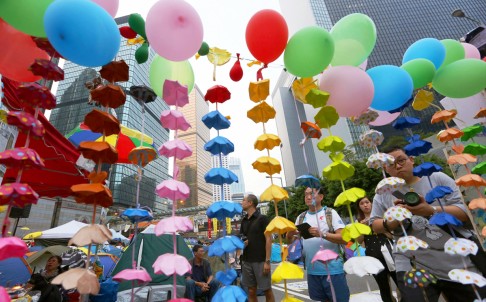



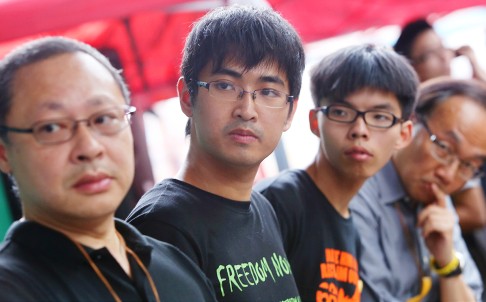

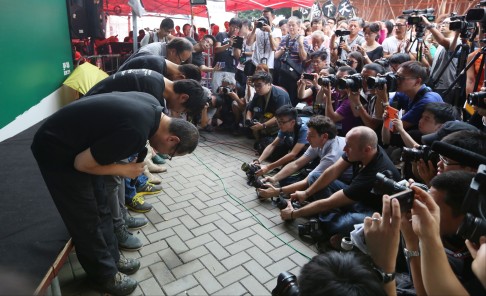

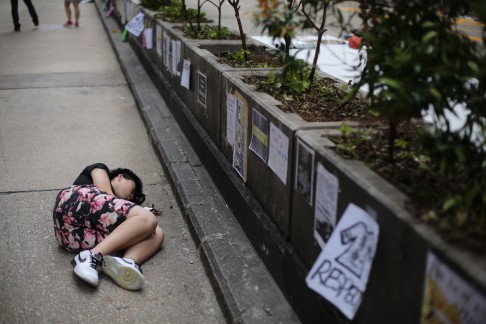
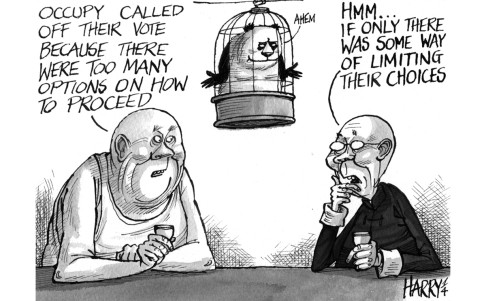
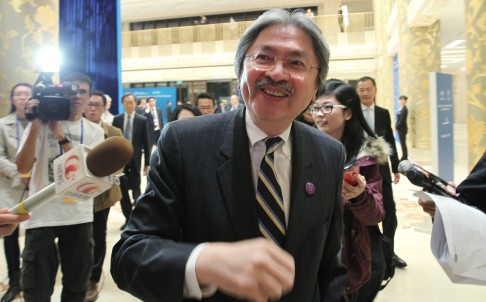
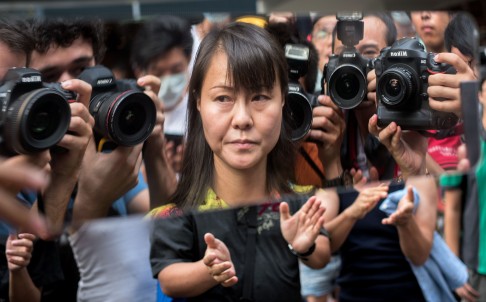
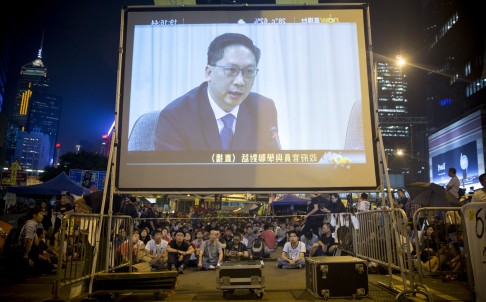
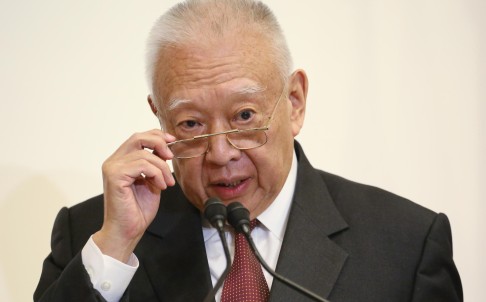
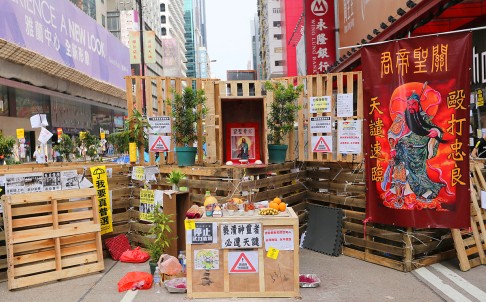

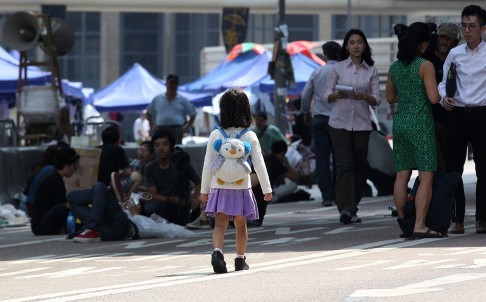
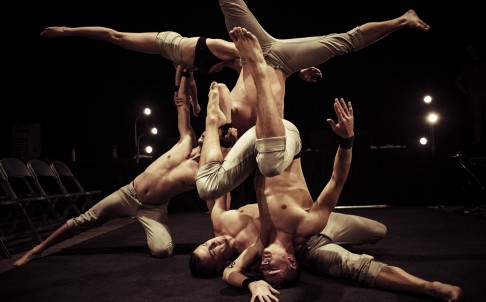
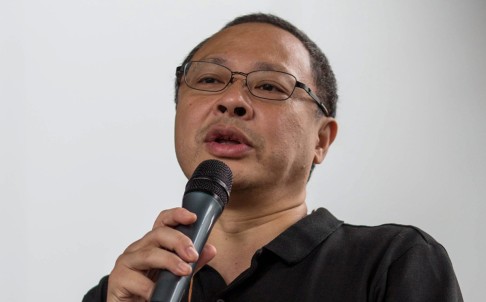

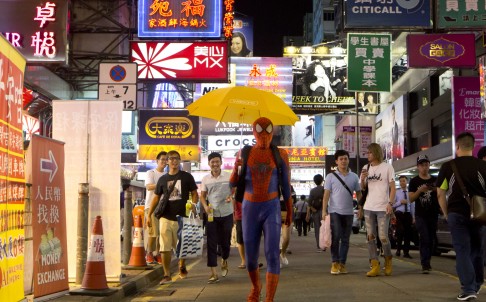
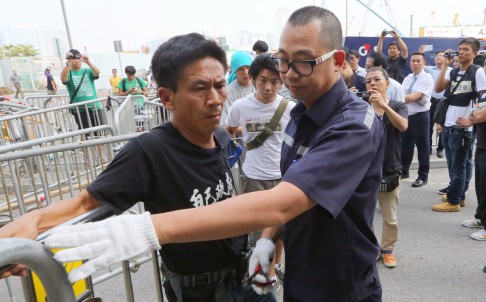
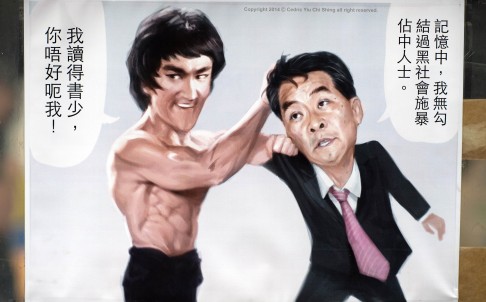
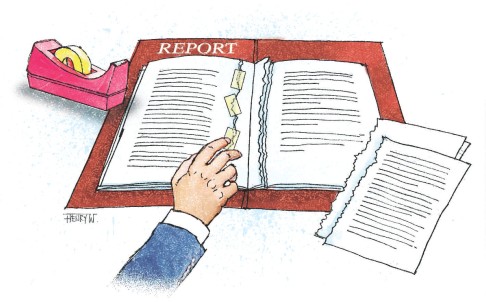
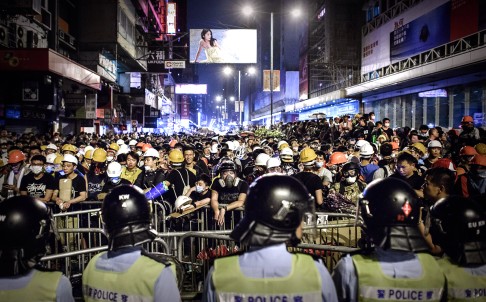
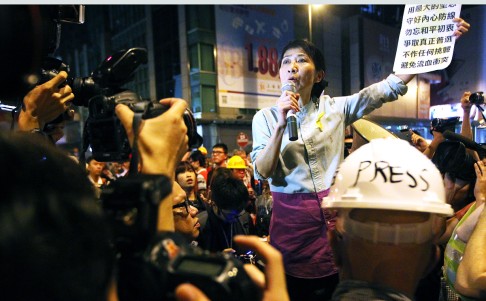
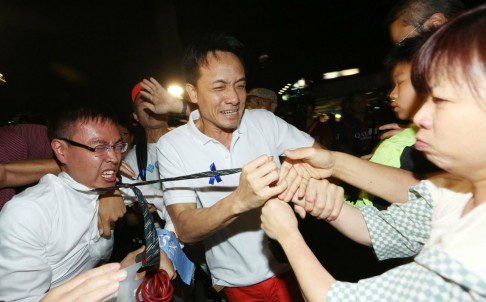
沒有留言:
張貼留言